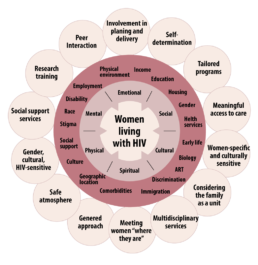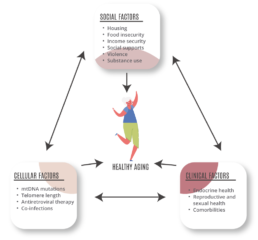The overarching goal of our research is to better understand healthy aging by, with, and for women+ living with HIV from cell-to-society.
GUIDING FRAMEWORKS AND PRINCIPLES
〰
Community Based Research
BCC3 follows the following community based research principles:
- Greater Involvement of People Living with HIV/AIDS (GIPA)
- Meaningful Involvement of Women Living with HIV/AIDS (MIWA)
- Ownership, Control, Access and Possession of data collection processes in Indigenous communities (OCAP) – enacting the Truth and Reconciliation Commission
The key to successful and meaningful research is community collaboration. Studies that utilize a community based research approach create results that can properly address the needs of the community. In doing so, researchers collaborate with the community along every step of the research journey, including: designing the research questions and protocol, conducting the study, interpreting results, and translating knowledge. It is vital to foster lasting and genuine connections between researchers and the community, to ask what the community needs and let this guide the research, and to come to research questions and study design together. This allows for a client-centered approach that can best improve care and access to health services. In regards to BCC3, this means ensuring that WLWH are included in each step of the research process and following the GIPA, MIWA and OCAP principles. In turn, community based research can create more meaningful findings and work to empower women living with HIV.
〰
Women-Centered Approach
BCC3 follows a women’s centered approach, which includes research that: purposely involves the perspectives of women; sees women as leaders and active participants in the research process; shares generated knowledge from research with the community to influence systemic and structural change. Some of the many different aspects of the lives of women living with HIV are shown in the Figure.
Figure: Components of a women-centered approach to research to support the holistic health and wellbeing of women living with HIV. Adapted from Carter et al 2013: https://www.ncbi.nlm.nih.gov/pmc/articles/PMC3545274/
〰
Cell-to-Society Framework - Addressing Social, Clinical, and Cellular Science
To understand healthy aging of women living with HIV, we need to study the various cellular, clinical, and social factors, that interact with one another and influence aging.
〰
Anti-racist, anti-oppression, social justice
With the integration of principles of anti-racism, anti-oppression, and social justice, we acknowledge the systemic gendered oppression and racism that women may experience, unique to each individual. Recognizing racism as a social determinant of health, researchers must collaborate with and listen to the needs of Black, Indigenous, and other people of colour (BIPOC) to ensure equitable participation in research, address health inequities, and practice allyship and anti-racist care. BIPOC individuals should have leading roles in research and guide study procedures in a culturally safe and appropriate way. An anti-oppressive approach acknowledges that women may experience oppression in a multitude of ways based on their social locations or identities. In following a social justice framework, we confront oppression and strive to create social change. Research that works towards social justice and change should impact policies and practices in Canada in order to improve the lives and health of women living with HIV of all different backgrounds.
Social determinants of health lens
In following a social determinants of health framework, we acknowledge the many interacting social factors have a large impact on health aging. The social determinants of health are the underlying social causes that affect people’s ability to access health services and must be addressed in order to have an opportunity for good health and well-being. Poverty, racism, gender inequity, food and housing security, access to health care, and susceptibility to HIV are examples of social determinants that impact the lives and health of women globally. We strive to assess the social determinants that women experience and how these impact their health, well-being, and aging.
VALUES
- Empowerment
- Equity
- Respect
- Inclusivity
- Integrity
- Intersectionality
- Partnership
- Accountability



〰